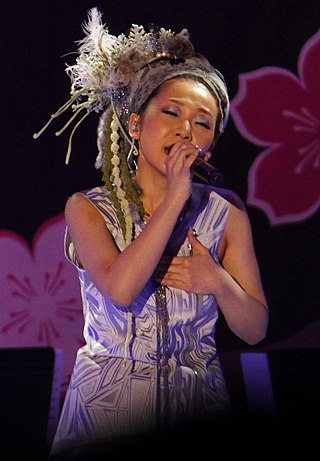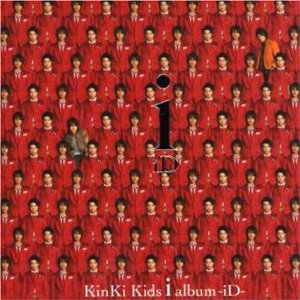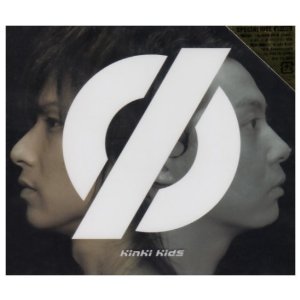
Japanese singer Ayumi Hamasaki has released eighteen studio albums, five compilation albums, twenty-six remix albums, four live albums and numerous singles and promotional singles. She debuted in 1995 under Nippon Columbia with the stage name Ayumi, releasing an extended play Nothing from Nothing, which was a collaboration with Dohzi-T and DJ Bass. Three years later, Hamasaki debuted again as a singer under Avex Trax with the single "Poker Face" (1998). Her first album A Song for ×× (1999) debuted at number one on Oricon's albums chart, and sold over 1.4 million copies.

The solo discography of Ringo Sheena features seven studio albums, five compilation albums, two extended plays and twenty-seven singles. Signing with Toshiba-EMI in 1998, Sheena released her debut single "Kōfukuron" in May 1998, when she was 19 years old. She subsequently released the singles "Kabukichō no Joō" and "Koko de Kiss Shite", the latter becoming her first hit. As of 2014, Sheena has been signed with EMI Records following EMI Music Japan being absorbed into Universal Music Japan.

The discography of Japanese R&B singer Misia consists of nine studio albums, three compilation albums, one extended play (EP), one live album, six remix albums, twenty-six singles, twelve promotional singles, eighteen video albums and thirty-seven music videos. In 1997, Misia signed a recording contract with BMG Japan and joined the then up-and-coming talent agency, Rhythmedia. Under the sub-label Arista Japan, Misia released her first single, "Tsutsumikomu Yō ni..." in February 1998, followed by "Hi no Ataru Basho" in May. In June, her debut album, Mother Father Brother Sister, opened at number three on the Oricon chart. The album peaked at number one three weeks later and stayed in the top five for eleven consecutive weeks. Mother Father Brother Sister was certified double million and won a Japan Record Award for Best Album, as well as a Japan Gold Disc Award for Pop Album of the Year. In 2000, Misia's second studio album, Love Is the Message, debuted at number one and was certified double million. It won a Japan Record Award for Best Album and a Japan Gold Disc Award for Pop Album of the Year. The album spawned three top ten hits: "Believe," "Wasurenai Hibi" and "Sweetness." Misia's first remix album, Misia Remix 2000 Little Tokyo, was released three months later and shot to number one. It sold over 800,000 copies and is the second best-selling remix album of all time in Japan.
KinKi Kids is a Japanese duo consisting of Koichi Domoto and Tsuyoshi Domoto under the talent agency Johnny & Associates. KinKi Kids was formed in 1993 and officially debuted on July 21, 1997. With more than 30 million physical copies sold, they are one of the best selling boy groups in Asian history and top 20 best-selling artists of all time in Japan. Although the members share the same surname, the only relation they have to each other is that they both hail from the Kinki region, hence the duo's name.
The discography of Japanese singer Mai Kuraki consists of fifteen studio albums, six compilation albums, twenty-three video albums, three remix albums, fifty-six singles, and sixteen promotional singles. Kuraki debuted in 1999, while she was still in high school, through Giza Studio. The label initially marketed Kuraki in the United States under the name Mai K, and released the single "Baby I Like" (1999). However, the single was a commercial failure which prompted the label to send her back to Japan. There, they released her single "Love, Day After Tomorrow", which peaked at number two on the Oricon Singles Chart and was certified million by the Recording Industry Association of Japan (RIAJ). The second single, "Stay by My Side" became her first number one single on the chart. Kuraki's debut album, Delicious Way, topped the Oricon Albums Chart and was certified triple million by the RIAJ.

"Koko de Kiss Shite." is Japanese singer Ringo Sheena's 3rd single and it was released on January 20, 1999, by Toshiba EMI, East World. It was certified gold twice by the RIAJ: Once in 1999 for 200,000 physical copies shipped, and once in 2011 for 100,000 paid downloads to cellphones.

The discography of Japanese musician Chara consists of fifteen studio albums, four compilation albums, two live albums, three extended plays one soundtrack, eight video albums and fifty singles. Chara debuted as a musician in 1991 with Sony Music Entertainment Japan, and saw great success with the singles "Swallowtail Butterfly " (1996), the theme song for the film Swallowtail, and "Yasashii Kimochi" (1997). After releasing ten albums with the label, Chara left Sony in 2004 to become an independent musician, releasing the album Something Blue (2005). The next year, Chara signed her second major label contract with Universal Music Japan, releasing four albums between 2007 and 2011.
The discography of Japanese group KinKi Kids consists of 17 studio albums, 6 compilation albums, 25 video albums and 44 singles. All of KinKi Kids' singles have reached number one in Japan on Oricon charts. All of their music has been released by Johnny's Entertainment in Japan. In Taiwan, Kinki Kids' music has been released under Forward Music from 1997 to 2000, Skyhigh Entertainment and What's Music in 2001, and Avex Taiwan from 2002 to the present.

A Album is the debut album of the Japanese group KinKi Kids. It was released on July 21, 1997, on the same day as their debut single "Garasu no Shōnen". The album debuted at the top of the Oricon charts, selling 315,330 copies in its first week. It was certified Million by RIAJ and is currently the duo's second best-selling album.

B Album is the second studio album of the Japanese duo KinKi Kids. It was released on August 12, 1998 and debuted at the top of the Oricon charts, selling 524,540 copies in its first week. The album was certified Million by RIAJ.

C Album is the third studio album of the Japanese duo KinKi Kids. It was released on August 4, 1999, and debuted at the top of the Oricon charts, selling 451,230 copies in its first week. The album was certified double platinum by the RIAJ for 800,000 copies shipped to stores in Japan.

D Album is the fourth studio album of the Japanese group KinKi Kids. It was released on December 13, 2000. Debuting at the top of the Oricon charts, the album sold 354,830 copies in its first week.

F Album is the sixth studio album of the Japanese duo KinKi Kids. It was released on December 26, 2002 and debuted at number two on the Oricon charts, selling 360,102 copies in its first week. The album was certified platinum by the RIAJ for 400,000 copies shipped to stores in Japan.

G Album: 24/7 is the seventh studio album of the Japanese duo KinKi Kids. It was released on October 22, 2003 and debuted at the top of the Oricon charts, selling 242,826 copies in its first week. The album was certified platinum by the RIAJ for 250,000 copies shipped to stores in Japan.

H Album: Hand is the eighth studio album of the Japanese duo KinKi Kids. After nearly a year without an album-release, the duo released H Album: Hand on November 16, 2005. It debuted at the top of the Oricon charts, selling 245,681 copies in its first week. The album was certified platinum by the RIAJ for 250,000 copies shipped to stores in Japan.

I Album: ID is the ninth studio album of the Japanese duo KinKi Kids. It was released on December 13, 2006. The album was certified platinum by the RIAJ for 250,000 copies shipped to stores in Japan.

Phi is the tenth studio album of the Japanese duo KinKi Kids. It is the first album by KinKi Kids to have a Greek-lettered title, rather than the traditional Latin-lettered album title. The album was certified platinum by the RIAJ for 250,000 copies shipped to stores in Japan.

KinKi Single Selection is the first greatest hits album by Japanese duo KinKi Kids. The album was released on May 17, 2000 and debuted at the top of the Oricon charts, selling 712,340 copies in its first week. The album eventually went on to sell over 1,200,000 copies by the end of the year and was certified Million by RIAJ.

KinKi Single Selection II is the second greatest hits album by Japanese duo KinKi Kids. The album was released on December 22, 2004 and debuted at the top of the Oricon charts, selling 356,117 copies in its first week and 544,594 copies by the end of 2005 as it was counted for the 2005 Oricon year. It was certified Double Platinum by RIAJ.

J Album is the eleventh studio album released by Japanese duo KinKi Kids on December 9, 2009. The album was certified gold by the RIAJ for 100,000 copies shipped to stores in Japan.

















